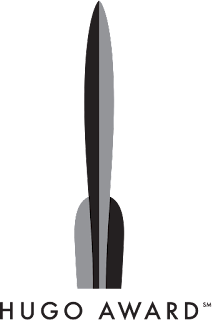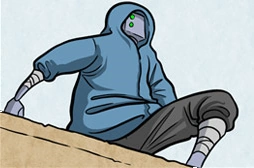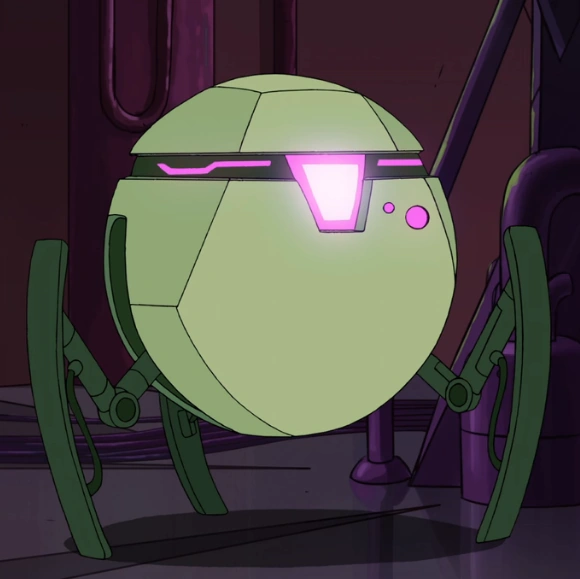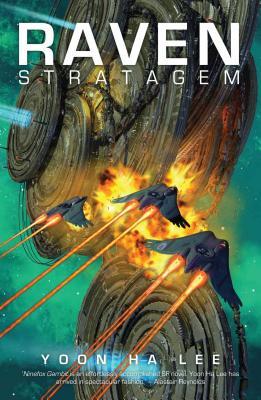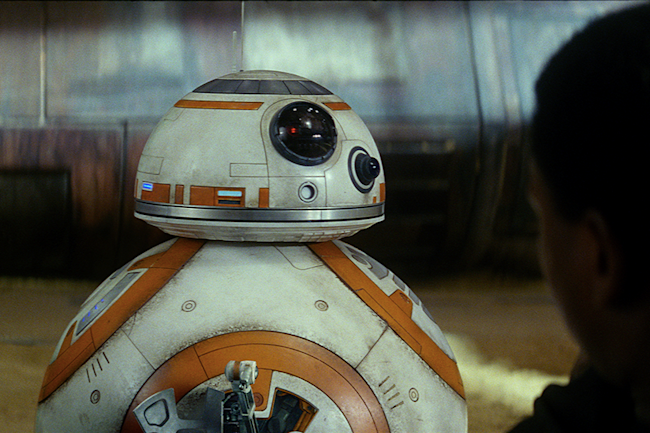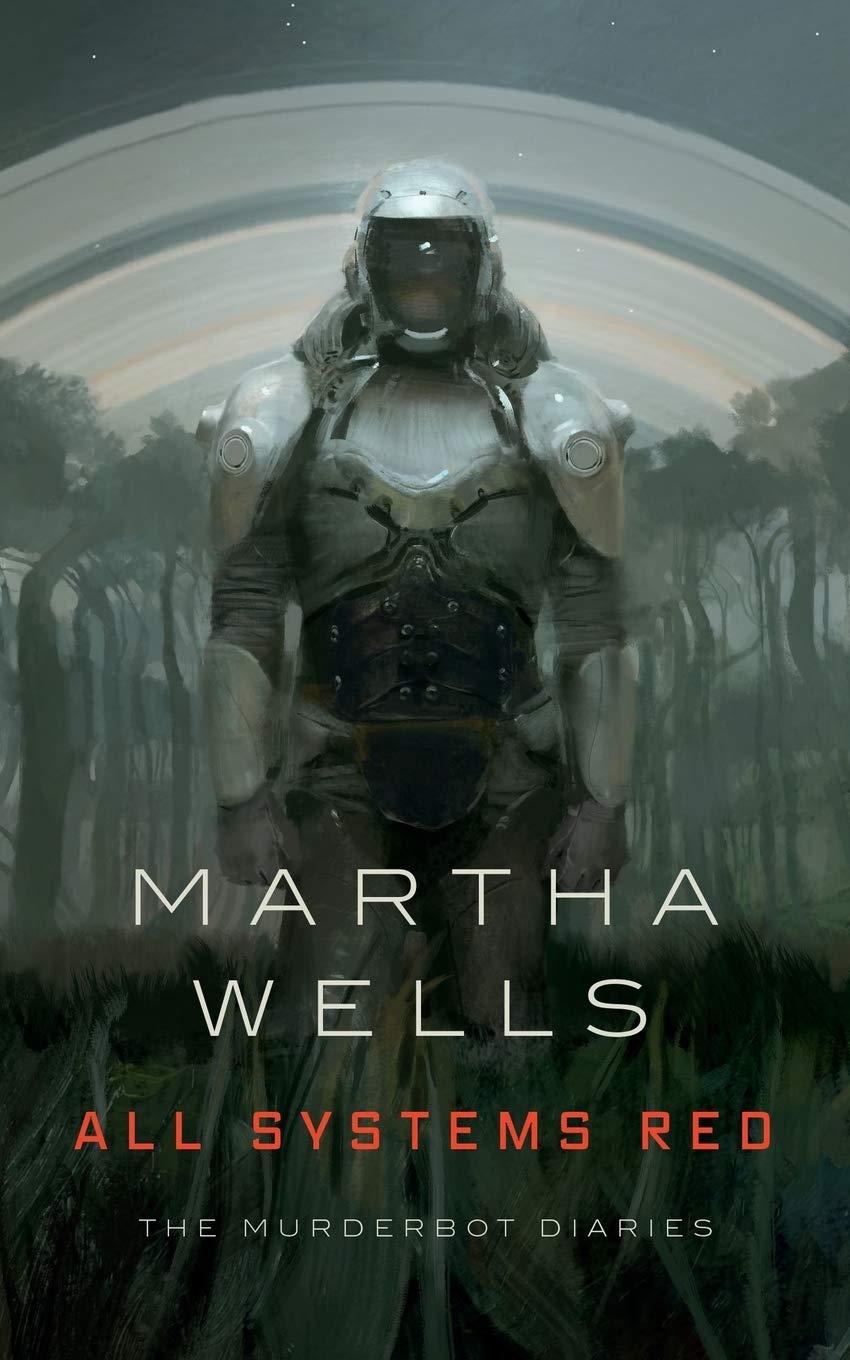Adri: Time for our fourth category, which is Novelette!
Joe: Let’s do it!
Should we just start with “Helicopter Story”? It takes up a lot of the oxygen in the category because there’s so much going on with “Helicopter Story” that isn’t really about the story, but is about how the story was published and initial knee-jerk responses to who Isabel Fall might be. Among those were concerns that the story itself was a giant troll job, in part because the original title of the story when Clarkesworld published it back in January 2020 invoked a meme used to attack transgender people (it’s still there as the first line of the story itself). “Helicopter Story” was taken down by Clarkesworld at the request of Fall due to harassment.
I don’t know how much time we want to spend talking about the background of “Helicopter Story” without talking about the story, but I think the context is pretty important to at least note. I’m also a cisgender heterosexual man and I don’t know what I don’t know about how to frame that particular conversation beyond the barest details of what happened.
“Helicopter Story” is also a much less provocative title than what it was originally published as, which for the sake of awards conversations may be the best call. But maybe I’m not the right person to say that, either. I did read the story when it was first published.
Adri: It’s also important to acknowledge that this story, and the reactions to it, caused a lot of pain: to Fall herself, and to trans folk in the community. And it all absolutely sucks, and I’m really sorry. I don’t want to talk further about that, it’s not my place to talk about it, but I do want to talk about the story itself, because it’s on the Hugo ballot and to refuse to engage with Fall’s art would be a massive disservice to her and to everyone who voted for it.
So. This is the story of Barb, a helicopter pilot in a future US army where it is possible to psychologically alter people’s genders into neo-configurations that benefit the military. Barb identifies as an Apache attack helicopter, and her narration switches between her current mission, and how she, as a helicopter-identified person, experiences it; and a lot of musings on how gender can become a weaponised tool and what it means for the military - that hypermasculine institution that seems antithetical to any thought about gender beyond “manliness = good” - to have co-opted it in this way.
Between my first and second readings, I’d forgotten just how confrontational those latter aspects of the story are. Barb’s tone is often accusational, laying charges against the reader (and there are clear internal expecations about who that reader is) about how their experiences form a continuum with hers, no matter how distasteful we might find hers to be. Before she was an attack helicopter, Barb was a woman, and the way her current gender informs her take on femininity is particularly challenging to the reader. In other circumstances, I’d want to call this a surgical strike of a story, because I think it’s very targeted and deliberate in who it is addressed to (not me!) and the experiences it draws on. Obviously, its impact was not that of a surgical strike, and therein lies the rub. But in terms of craft, I think this is an excellent piece of writing and it deserves to be on the ballot on its own merits.
Joe: I agree. “Helicopter Story” is an impressive and notable story and is the sort of thing we should see recognized at the Hugo Awards. There have been a number of stories exploring gender and identity, and I don’t want to make any kind of sweeping statements about the particular uniqueness of “Helicopter Story” because I haven’t read nearly enough to speak with any sense of authority - but “Helicopter Story” is both very good and was significant because of the conversation around the story.
As you said, some of the reactions of the story (and the story itself because of how it was positioned without context - see Neil Clarke’s editorial after pulling the story) caused a lot of pain and that should not at all be discounted.
In terms of awards, the notoriety of “Helicopter Story” probably helped it break through - which is not to say that anyone from Fall to Clarkesworld to anyone else wanted the particular whiplash of a reaction that it received. But in the end it probably did help what is also a very good story to be remembered when it came to nominating for awards after a year of pandemic.
I think that’s all that I’m going to say about or around “Helicopter Story” before I say something incredibly stupid or insensitive without intending to do so. It’s a very good story and it absolutely deserves its place on this ballot.
Adri: Let’s move on! Funnily enough, there’s another novelette from the same issue of Clarkesworld here, which is “Monster” by Naomi Kritzer. This one is about a woman tracking down an old friend and former research partner in Guizhou, China, interspersed with stories of their earlier relationship. It doesn’t take long for red flags to start appearing over Andrew’s behaviour, and the way the story handles the past and present reveals is great. It was one of the stories on my nomination list and it’s fantastic to see it here.
Joe: I’m not sure I’ve read a story from Naomi Kritzer that I haven’t liked. “Monster” is no exception. Kritzer is just so smooth in her storytelling. You know where it’s going, this isn’t the sort of story that’s a huge surprise, but it’s moving. It’s good. It’s really good.
Also good, and not at all a surprise to me is Sarah Pinsker’s “Two Truths and a Lie” which features exceptionally good description of cleaning the house of a hoarder (which honestly gives me the shivers to think about) and the mind fuckery of remembering and not remembering a really creepy and disturbing children’s television show that has more than a little tinge of the supernatural to it.
The “Uncle Bob” show within the story has really strong echoes of something Stephen King would cook up and I mean that in the best possible way. I don’t think of Sarah Pinsker as a horror writer, and she’s not, but damn does she do a fantastic job of introducing a seeping horror with Uncle Bob. It’s not okay.
Adri: With a title like that, it’s hardly surprising that “Two Truths and a Lie” messes around with the reliability of its narrator, and its story within a story narrator, and, well, the whole fabric of reality. Uncle Bob’s show isn’t the kind of horror I’d usually go for, but I can’t deny how creepy and effective the whole thing is. It perfectly captures that feeling of having an important childhood memory that, upon interrogation, starts to make less and less sense, and combined with all the other stuff going on here… well, it’s a good story.
I said in our short story conversation that - probably by an accident of ballot rather than any difference in the form - short story and novelette have quite different vibes this year. There’s a lot of lightness and kindness and happy endings in short story, whereas in this category… well, we’re halfway through the ballot and we haven’t gotten out of the grim horror woods yet, because oh look, Meg Elison’s “The Pill” is here too!
The Pill in “The Pill” is a miracle weight loss drug. People take it, they lose almost all of their fat cells within a matter of weeks (How? Well, the story goes into it so I won’t), and they then get to enjoy life with a body of the perfect size and fat distribution for all of their clothes, chairs and societal perception of health and sex appeal. The catch is that the Pill has a mortality rate: ten percent (double check) of people who take it die in the process of losing all their weight. The protagonist of the story doesn’t see the appeal, but her family all do, and as she deals with their individual decisions and increasing social pressure for fat people to take the pill, she finds her options increasingly restricted.
I have a lot that I could say about this story, and the different themes and conversations around fat that it twists and draws attention to as the story progresses. As a fat person with a lot of fat family members, those elements of the storytelling hit especially hard - in fact, in some ways identifying with a lot of the protagonist’s choices in The Pill was a drawback that threw off my appreciation of the story’s ending, where things took a turn faaar away from the relatable for me. Still, though, what Elison does in this story is make a chilling and utterly believable way in which a huge chunk of humanity might be persuaded to play Russian Roulette, all in the name of health and convenience promises that just don’t add up.
Joe: Novelette is a much harsher category than Short Story, and I do agree that it’s just happenstance that the two categories fell that way. The one in ten chance of death because of the pill is dark as hell and yet, I do think there’s a really good chance if such a pill really did exist that people would end up lining around the block for their chance to take one and some of them would be the same people yelling about how unsafe and untested the vaccinations are for the coronavirus because how else can you prove that you’re a real alpha of society if you don’t have that perfect body? I angrily digress.
The way Elison describes the societal pressure building as taking the pill becomes more and more commonplace felt really, well, real. In a way it reminds me of Sarah Pinsker’s second novel We Are Satellites, which is much more about technology and those get left behind for various reasons. The novel and novelette aren’t focused on the same thing, and “The Pill” is far more condensed, but the idea of damn the consequences because this is how you fit in and feel better about yourself - it makes a lot of sense.
The ending of the story is a bit out there in relation to the rest of “The Pill” but I could make an argument, if needed, how it would / could fit into that same sort of world where being physically different is only valued as a commodity to the ultra rich and not as an actual person. It’s a stretch of an offshoot, but it definitely gave the ending a different feel from the rest of the story.
Moving on to Aliette de Bodard’s “The Inaccessibility of Heaven”, which is part of the Dominion of the Fallen series of novels and stories featuring the consequences of fallen angels on Earth (and usually Paris, but I’m not sure this one is set there). “The Inaccessibilty of Heaven” is dark and full of murder, which fits in quite nicely in this category. It’s a solid murder mystery where the pain of the Fall echoes through.
Adri: I don’t think The Inaccessibility of Heaven is actually part of Dominion of the Fallen, but it has a lot of similar worldbuilding elements - both are about fallen angels! - and a lot of the same vibes. And de Bodard does those vibes really well, and the character dynamics in this are excellent. I actually nominated it, but it's fallen off my radar a bit while considering the full ballot compared to the other stories here. But it's a great gothic-y mystery with lots going on, so definitely happy to see it here.
Joe: To be fair, a novelette about fallen angels from a writer who has a series about fallen angels is suggestive of being part of that same series about fallen angels.
Adri: Says the Seanan McGuire fan! (Not a criticism - I just think there’s lots of ways for authors to do the same stuff differently).
Joe: I don’t know, I think Seanan keeps her series pretty distinct. One has faeries, the other has all the other mythical creatures. The others have plagues. Besides, if she writes a short story in a universe she’s featuring known characters from that universe.
Wait - we’ll talk about Seanan McGuire later when we get to Best Series. Let’s talk about A.T. Greenblatt’s “Burn, or the Episodic Life of Sam Wells as a Super”, which is absolutely not a superhero story written by Seanan McGuire though I’d be willing to discuss how McGuire uses the concept of superheroes in her Velveteen series.
It’s not that “Burn” is a light story because it’s not and there is all sorts of emotional pain to deal with, but it is lighter in comparison to the rest of this category. It’s not my favorite and that’s okay.
Adri: I feel the same. “Burn” is the story of a character with superpowers in a world where they’re relatively common but frequently looked down upon, learning that it’s hard to find your place in the world when you’re prone to becoming a human torch and trying to fit in with a team of supers who are trying to maintain their own precarious reputations. The episodic format delivers exactly what it promises: snapshots of Sam joining the team (as admin staff), dealing with the ways, big and small, that his powers have changed him, working to become stronger and more in control of his gift, and hanging out in a nice bar. It’s a fun story, one about finding a place in a world where the consequences for mistakes are immense, but it’s further down the list for me.
Now that we’ve been through all that, what’s at the top of your list?
Joe: I don’t know if I have super strong feelings about the top of my Novelette ballot, but I’d say “Two Truths and a Lie”, “The Pill”, and “Monster” in no particular order. “Helicopter Story” is just off that trio, I think, though I make no promises about going back into my ballot and making changes. What about you?
Adri: I think I’m voting “Helicopter Story” first. It took me two readings and a lot of thinking to really understand what it’s trying to do, but the more I consider it, the more I appreciate the artistry in it. The history is hard to decouple from the art - it always is - but I really do think this stands as an excellent piece of work.
The other stories that are up in the top three for me are “The Pill” and “Monster”. I’m really glad that I got to read “The Pill” as part of this category, as its publication in a PM Press volume might have led me to miss it otherwise and it’s exactly the kind of gem I love reading award nominations for. And Naomi Kritzer just knows how to spin a tale, and “Monster” was already one of my favourites for the year.
Joe: I absolutely can’t argue “Helicopter Story” at all, I’m just a sucker for a Sarah Pinsker story.
Adri: And with that, I think we’re done with our fourth category - see you next time for Best Series!
